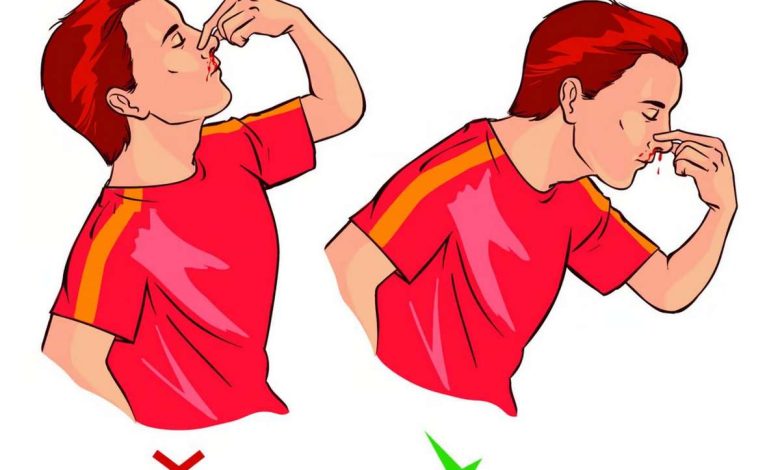Bleeding from the nose: what is this, causes, symptoms, diagnostics, treatment, prevention

Nosebleed; Bleeding from the nose; Epistaxis
Nosebleeds are a common problem, which can occur at any age, although they are more common in children and the elderly. Nosebleeds can be mild or severe and can last from a few seconds to a few minutes.. Most nosebleeds are not serious and can be easily treated., but if you experience frequent or severe nosebleeds, it is important to consult a doctor.
What is a nosebleed?
Nosebleed is a condition, in which blood flows from one or both nostrils. This can happen due to the presence of numerous blood vessels in the nose., which are easily damaged. The inside of the nose is lined with a delicate mucous membrane, which can easily irritate and bleed.
Causes of nosebleeds
There are several common causes of nosebleeds., including:
- dry air. Dry air can cause, that the nasal membranes become dry and cracked, which will cause bleeding.
- Trauma: blow to the nose, eg, due to a fall or sports injury, can cause nosebleeds.
- Allergies: Allergic reactions can cause inflammation of the nasal membranes, which will cause bleeding.
- Infection: Infection, such as a cold or sinusitis, can cause inflammation of the nasal membranes, which leads to bleeding.
- Health Concerns: some medical disorders, such as high blood pressure, may increase the risk of nosebleeds.
Symptoms of nasal bleeding
The main sign of nosebleeds is the presence of blood from one or both nostrils.. Other symptoms may include:
- Dizziness
- Fatigue
- Nausea
Diagnosis of epistaxis
Diagnosis of a nosebleed is usually based on a physical examination and medical history.. Your doctor may ask you questions about your symptoms and any medical conditions, which you have. In some cases, additional tests may be ordered to determine the cause of a nosebleed., such as x-rays or computed tomography.
Treatment of epistaxis
Treatment for a nosebleed depends on the cause and severity of the bleeding.. In most cases, simple first aid measures, such as pinching your nose and bending forward, may help stop bleeding.
If the nosebleed is severe or persistent, may need treatment. It could be drugs, such as decongestants or nasal sprays, or procedures, such as cauterization or nasal packing.
Home Treatment for Nosebleeds
Most nosebleeds can be easily treated at home.. Simple first aid measures, such as pinching your nose and bending forward, may help stop bleeding.
If the nosebleed is minor, it can be treated at home, by doing the following:
- Sit and lean forward slightly
- Press the soft parts of the nose together for 10-15 minutes
- Apply a cold compress to the bridge of your nose
- Use a nasal spray, eg, saline, to moisten the nasal passages
- Avoid picking your nose or blowing your nose for at least 24 hours
- Avoid taking hot showers or exposing your face to extreme temperatures
- Avoid strenuous physical activity
To prevent future nosebleeds, You can:
- Use a humidifier, to add moisture to the air
- Use a saline nasal spray, to keep the nasal membranes moist.
- Don't blow your nose too hard or too often
- Avoid picking your nose
Prevention of epistaxis
To prevent nosebleeds:
- Keep the air in your home moist with a humidifier
- Avoid exposure to dry air, eg, from air conditioning or heating systems.
- Don't blow your nose too hard or too often
- Use a saline nasal spray, to keep the nasal membranes moist.
- Avoid picking your nose
In conclusion, nosebleeds are a common problem, which may occur for various reasons., including dry air, injury, allergies, infections and diseases.
Most nosebleeds can be easily treated at home., but if you experience frequent or severe nosebleeds, it is important to consult a doctor for proper diagnosis and treatment.
To prevent nosebleeds, it is important to maintain the humidity in your home, avoid exposure to dry air, use saline nasal spray, don't blow your nose too hard and don't pick your nose.
By following these simple precautions, you can reduce the risk of nosebleeds and enjoy a healthy and comfortable life.
Used sources and literature
Kuan EC, Palmer JN. Epistaxis. In: Flint PW, Francis HW, Haughey BH, et al, eds. Cummings Otolaryngology: Head and Neck Surgery. 7th ed. Philadelphia, PA: Elsevier; 2021:chap 47.
Pfaff JA, Moore GP. Otolaryngology. In: Walls RM, Hockberger RS, Gausche-Hill M, eds. Rosen’s Emergency Medicine: Concepts and Clinical Practice. 9th ed. Philadelphia, PA: Elsevier; 2018:chap 62.
Savage S. Management of epistaxis. In: Fowler GC, ed. Pfenninger and Fowler’s Procedures for Primary Care. 4th ed. Philadelphia, PA: Elsevier; 2020:chap 205.
